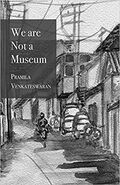Book review of We Are Not a Museum by Pramila Venkateswaran
by Rohit Dey

Amidst the aqua walls of trinket shops, Hebrew numerals on the tower clock, gold pulpit encircling the slim pillars of Paradesi synagogue in velvet drape diagonally syncing to the square prints on its glass chandelier-lit ceiling, Pramila Venkateswaran kept on 'knocking' the doors of a bygone 'Paradesi home' until her recollected memories of 'Kashnam, manslaughter, samayam curling up her tongue around the themes of m's and y's' conjured up the confluence of 'Hebrew in the Synagogue and Malayalam at home' in her vehement collection of poems We are Not a Museum.
The vivid picturisation of Malayalam as 'a land of curlicues,' incorporating images of snails, jellyfish, letters with no backbone,' and its microcosmic representation in Pardesi synagogue that 'fills with Malayalam, Hebrew and English' demonstrates Pramila Venkateswaran's prowess in articulating a migrated Jew's fervent wish to call the 'unfamiliar walls' of Kochi his own.
'From Israel to kochi' evokes a saga of Israel scholars' homecoming to breathe the same air once their forebears breathed, taste the 'shabbat meal served on banana leaves' bathed in the folksy aroma of rice, fish Kuzhambu and pineapple wedges.
The couplets from 'Cemetery' steeped in biblical allusions to 'Noah', 'an iron gate,' 'David, Joseph' encapsulates the cycle of life that comes full circle as the cemetery gates make way for the ultimate homecoming of the deceased. The last rhyming couplet echoes the anodyne note of separation, of mothers' shriek of silence as they "look for their children in the billowing waves…"
In the realms of decolonization, the apprehensive tone of premonition can be heard in the second quatrain of 'Dear Noah' that the "Foreign banking will emerge as a new territory, a reverse colonialism."
The motherly tone expresses her contentment as the son, Noah, is now working in a bank instead of fighting for the British in the East Indies. Here also the biblical character Noah is serving a saviour, a saviour rescuing his culture, the relics of his race from being wiped away by the marauding Western culture that is consciously trying to destroy the 'salad bowl' of multiculturalism.
Ferreting out the history of a migrated race and its remnants, Pramila Venkateswaran's narrative style of poetry brings together poetic fervour and a mythohistorical rendition through meticulous use of metaphors and vivid images of the land of Parashuram.
While reading this book, one can't help but take a stroll through the poems, around the nooks and crannies of Kerala, and walk along the Jewish street to reach the Pardesi synagogue that is now made into a museum, whose walls assert vigorously the non-museum-like existence of the Jews, as echoed in Pramila Venkateswaran's lines in We Are Not a Museum.
The vivid picturisation of Malayalam as 'a land of curlicues,' incorporating images of snails, jellyfish, letters with no backbone,' and its microcosmic representation in Pardesi synagogue that 'fills with Malayalam, Hebrew and English' demonstrates Pramila Venkateswaran's prowess in articulating a migrated Jew's fervent wish to call the 'unfamiliar walls' of Kochi his own.
'From Israel to kochi' evokes a saga of Israel scholars' homecoming to breathe the same air once their forebears breathed, taste the 'shabbat meal served on banana leaves' bathed in the folksy aroma of rice, fish Kuzhambu and pineapple wedges.
The couplets from 'Cemetery' steeped in biblical allusions to 'Noah', 'an iron gate,' 'David, Joseph' encapsulates the cycle of life that comes full circle as the cemetery gates make way for the ultimate homecoming of the deceased. The last rhyming couplet echoes the anodyne note of separation, of mothers' shriek of silence as they "look for their children in the billowing waves…"
In the realms of decolonization, the apprehensive tone of premonition can be heard in the second quatrain of 'Dear Noah' that the "Foreign banking will emerge as a new territory, a reverse colonialism."
The motherly tone expresses her contentment as the son, Noah, is now working in a bank instead of fighting for the British in the East Indies. Here also the biblical character Noah is serving a saviour, a saviour rescuing his culture, the relics of his race from being wiped away by the marauding Western culture that is consciously trying to destroy the 'salad bowl' of multiculturalism.
Ferreting out the history of a migrated race and its remnants, Pramila Venkateswaran's narrative style of poetry brings together poetic fervour and a mythohistorical rendition through meticulous use of metaphors and vivid images of the land of Parashuram.
While reading this book, one can't help but take a stroll through the poems, around the nooks and crannies of Kerala, and walk along the Jewish street to reach the Pardesi synagogue that is now made into a museum, whose walls assert vigorously the non-museum-like existence of the Jews, as echoed in Pramila Venkateswaran's lines in We Are Not a Museum.




